2016翻译硕士复习资料:英译中国现代散文选(2)
2016翻译硕士复习资料:英译中国现代散文选(28)
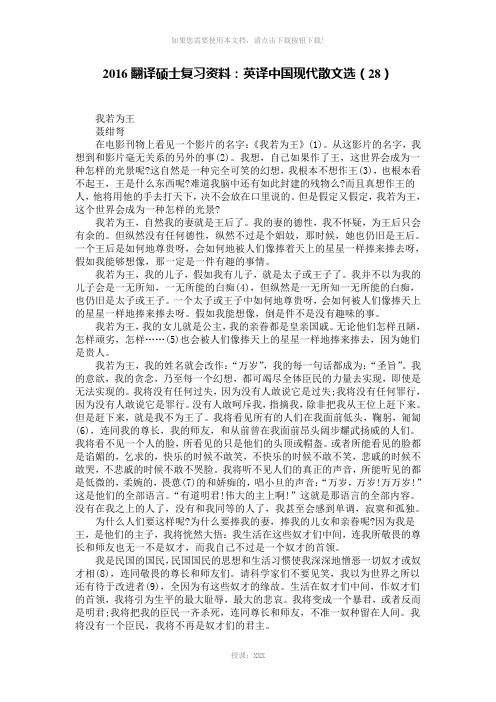
2016翻译硕士复习资料:英译中国现代散文选(28)我若为王聂绀弩在电影刊物上看见一个影片的名字:《我若为王》(1)。
从这影片的名字,我想到和影片毫无关系的另外的事(2)。
我想,自己如果作了王,这世界会成为一种怎样的光景呢?这自然是一种完全可笑的幻想,我根本不想作王(3),也根本看不起王,王是什么东西呢?难道我脑中还有如此封建的残物么?而且真想作王的人,他将用他的手去打天下,决不会放在口里说的。
但是假定又假定,我若为王,这个世界会成为一种怎样的光景?我若为王,自然我的妻就是王后了。
我的妻的德性,我不怀疑,为王后只会有余的。
但纵然没有任何德性,纵然不过是个娼妓,那时候,她也仍旧是王后。
一个王后是如何地尊贵呀,会如何地被人们像捧着天上的星星一样捧来捧去呀,假如我能够想像,那一定是一件有趣的事情。
我若为王,我的儿子,假如我有儿子,就是太子或王子了。
我并不以为我的儿子会是一无所知,一无所能的白痴(4),但纵然是一无所知一无所能的白痴,也仍旧是太子或王子。
一个太子或王子中如何地尊贵呀,会如何被人们像捧天上的星星一样地捧来捧去呀。
假如我能想像,倒是件不是没有趣味的事。
我若为王,我的女儿就是公主,我的亲眷都是皇亲国戚。
无论他们怎样丑陋,怎样顽劣,怎样……(5)也会被人们像捧天上的星星一样地捧来捧去,因为她们是贵人。
我若为王,我的姓名就会改作:“万岁”,我的每一句话都成为:“圣旨”。
我的意欲,我的贪念,乃至每一个幻想,都可竭尽全体臣民的力量去实现,即使是无法实现的。
我将没有任何过失,因为没有人敢说它是过失;我将没有任何罪行,因为没有人敢说它是罪行。
没有人敢呵斥我,指摘我,除非把我从王位上赶下来。
但是赶下来,就是我不为王了。
我将看见所有的人们在我面前低头,鞠躬,匍匐(6),连同我的尊长,我的师友,和从前曾在我面前昂头阔步耀武扬威的人们。
我将看不见一个人的脸,所看见的只是他们的头顶或帽盔。
或者所能看见的脸都是谄媚的,乞求的,快乐的时候不敢笑,不快乐的时候不敢不笑,悲戚的时候不敢哭,不悲戚的时候不敢不哭脸。
2016翻译硕士复习资料:英译中国现代散文选(11) (1)
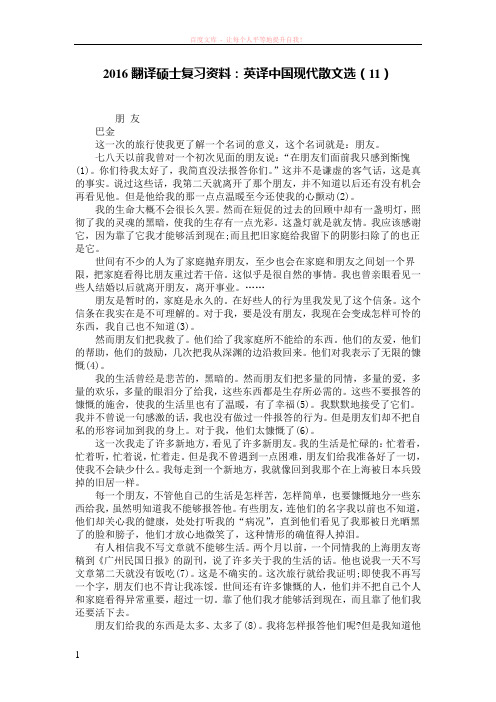
2016翻译硕士复习资料:英译中国现代散文选(11)朋友巴金这一次的旅行使我更了解一个名词的意义,这个名词就是:朋友。
七八天以前我曾对一个初次见面的朋友说:“在朋友们面前我只感到惭愧(1)。
你们待我太好了,我简直没法报答你们。
”这并不是谦虚的客气话,这是真的事实。
说过这些话,我第二天就离开了那个朋友,并不知道以后还有没有机会再看见他。
但是他给我的那一点点温暖至今还使我的心颤动(2)。
我的生命大概不会很长久罢。
然而在短促的过去的回顾中却有一盏明灯,照彻了我的灵魂的黑暗,使我的生存有一点光彩。
这盏灯就是就友情。
我应该感谢它,因为靠了它我才能够活到现在;而且把旧家庭给我留下的阴影扫除了的也正是它。
世间有不少的人为了家庭抛弃朋友,至少也会在家庭和朋友之间划一个界限,把家庭看得比朋友重过若干倍。
这似乎是很自然的事情。
我也曾亲眼看见一些人结婚以后就离开朋友,离开事业。
……朋友是暂时的,家庭是永久的。
在好些人的行为里我发见了这个信条。
这个信条在我实在是不可理解的。
对于我,要是没有朋友,我现在会变成怎样可怜的东西,我自己也不知道(3)。
然而朋友们把我救了。
他们给了我家庭所不能给的东西。
他们的友爱,他们的帮助,他们的鼓励,几次把我从深渊的边沿救回来。
他们对我表示了无限的慷慨(4)。
我的生活曾经是悲苦的,黑暗的。
然而朋友们把多量的同情,多量的爱,多量的欢乐,多量的眼泪分了给我,这些东西都是生存所必需的。
这些不要报答的慷慨的施舍,使我的生活里也有了温暖,有了幸福(5)。
我默默地接受了它们。
我并不曾说一句感激的话,我也没有做过一件报答的行为。
但是朋友们却不把自私的形容词加到我的身上。
对于我,他们太慷慨了(6)。
这一次我走了许多新地方,看见了许多新朋友。
我的生活是忙碌的:忙着看,忙着听,忙着说,忙着走。
但是我不曾遇到一点困难,朋友们给我准备好了一切,使我不会缺少什么。
我每走到一个新地方,我就像回到我那个在上海被日本兵毁掉的旧居一样。
2016翻译硕士复习资料:散文翻译

2016翻译硕士复习资料:散文翻译(2)《水浒》的开篇:纷纷五代乱离间,一旦云开复见天! 草木百年新雨露,车书万里旧江山。
寻常巷陌陈罗绮,几处楼台奏管弦。
天下太平无事日,莺花无限日高眠。
After Five Dynasties’ turmoil and strife,The clouds dispersed and revealed the sky,Refreshing rain brought old trees new life,Culture and learning once again were high.Ordinary folk in the lanes wore silk,Music drifted from mansions and towers,Under the heavens all was serene,Men dozed off at noon midst gay birds and flowers.但愿人长久,千里共婵娟。
We wish each other a long life so as to share the beauty of this graceful moonlight, even though miles apart.独在异乡为异客,每逢佳节倍思亲。
A lonely stranger in a strange land I am cast, I miss my family all the more on every festive day.大江东去,浪淘尽,千古风流人物。
The endless river eastward flows; with its huge waves are gone all those gallant heroes of bygone years.二人同心,其利断金。
If two people are of the same mind, their sharpness can cut through metal.富贵不能淫,贫贱不能移,威武不能曲,此之谓大丈夫。
2016翻译硕士复习资料:英译中国现代散文选(3)
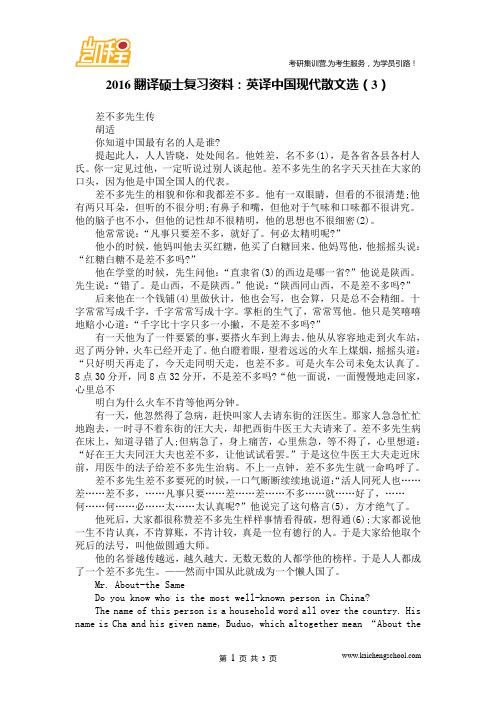
2016翻译硕士复习资料:英译中国现代散文选(3)差不多先生传胡适你知道中国最有名的人是谁?提起此人,人人皆晓,处处闻名。
他姓差,名不多(1),是各省各县各村人氏。
你一定见过他,一定听说过别人谈起他。
差不多先生的名字天天挂在大家的口头,因为他是中国全国人的代表。
差不多先生的相貌和你和我都差不多。
他有一双眼睛,但看的不很清楚;他有两只耳朵,但听的不很分明;有鼻子和嘴,但他对于气味和口味都不很讲究。
他的脑子也不小,但他的记性却不很精明,他的思想也不很细密(2)。
他常常说:“凡事只要差不多,就好了。
何必太精明呢?”他小的时候,他妈叫他去买红糖,他买了白糖回来。
他妈骂他,他摇摇头说:“红糖白糖不是差不多吗?”他在学堂的时候,先生问他:“直隶省(3)的西边是哪一省?”他说是陕西。
先生说:“错了。
是山西,不是陕西。
”他说:“陕西同山西,不是差不多吗?”后来他在一个钱铺(4)里做伙计,他也会写,也会算,只是总不会精细。
十字常常写成千字,千字常常写成十字。
掌柜的生气了,常常骂他。
他只是笑嘻嘻地赔小心道:“千字比十字只多一小撇,不是差不多吗?”有一天他为了一件要紧的事,要搭火车到上海去。
他从从容容地走到火车站,迟了两分钟,火车已经开走了。
他白瞪着眼,望着远远的火车上煤烟,摇摇头道:“只好明天再走了,今天走同明天走,也差不多。
可是火车公司未免太认真了。
8点30分开,同8点32分开,不是差不多吗?“他一面说,一面慢慢地走回家,心里总不明白为什么火车不肯等他两分钟。
有一天,他忽然得了急病,赶快叫家人去请东街的汪医生。
那家人急急忙忙地跑去,一时寻不着东街的汪大夫,却把西街牛医王大夫请来了。
差不多先生病在床上,知道寻错了人;但病急了,身上痛苦,心里焦急,等不得了,心里想道:“好在王大夫同汪大夫也差不多,让他试试看罢。
”于是这位牛医王大夫走近床前,用医牛的法子给差不多先生治病。
不上一点钟,差不多先生就一命呜呼了。
差不多先生差不多要死的时候,一口气断断续续地说道:“活人同死人也……差……差不多,……凡事只要……差……差……不多……就……好了,……何……何……必……太……太认真呢?”他说完了这句格言(5),方才绝气了。
2016翻译硕士复习资料:英译中国现代散文选(33)

2016翻译硕士复习资料:英译中国现代散文选(33)母亲的回忆朱德得到母亲去世的消息,我很悲痛。
我爱我母亲,特别是她勤劳一生,很多事情是值得我永远回忆的。
我家是佃农,祖籍广东韶关籍人,在“湖广填四川” (1)时迁移四川仪陇县马鞍场。
世代为地主耕种,家境是贫苦的(2),和我们来往的朋友也都是老老实实的贫苦农民。
母亲一共生了十三个儿女,因为家境贫穷,无法全部养活,只留下八个,以后再生下的被迫溺死了。
这在母亲心里是多么悲痛、悲哀和无可奈何的事啊!母亲把八个孩子一手养大成人。
可是她的时间大半给家务和耕种占去了,没法多照顾孩子,只好让孩子们在地里爬着。
母亲是个“好劳动” (3)。
从我能记忆时起,总是天不亮就起床。
全家二十口人,妇女轮班煮饭,轮到就煮一年。
母亲把饭煮了,还要种田种菜,喂猪养蚕,纺棉花。
因为她身材高大结实,还能挑水挑粪。
母亲这样地整日劳碌着,我们到四五岁时就很自然地在旁边帮她的忙,到八九岁时就不单能挑能背,还会种地了。
记得那时我从学堂回家,母亲总在灶上汗流满面地烧饭,我就悄悄把书本一放,挑水或放牛去了。
有的季节里,我上午读书下午种地,一到农忙便整月停在地里跟着母亲劳动。
这个时期母亲教给我许多生产知识。
佃农家庭的生活自然是很苦的。
可是由于母亲的聪明能干,却很舒服。
我们把桐子榨油来点灯。
吃的是豌豆饭,菜花,红薯饭,杂粮饭,把菜籽榨出的油放在饭里做调料,这种地主富人家看也不看的饭食,母亲却能做得使一家吃起来有滋味。
赶上丰年,才能缝上一些新衣服,衣服也是自己生产出来的。
母亲亲手纺出线,请人织成布,染了颜色,我们叫做“家织布”,有铜钱那样厚,一套衣服老大穿过了,老二老三接下来穿还穿不烂(4)。
劳动的家庭是有规律有组织的。
我的祖父是一个中国标本式的农民,到了八九十岁还非耕田不可,不耕田就会害病,直到临死前不久还在地里劳动。
祖母是家庭的组织者,一切生产事务由她管理分派。
每年除夕,分派好一年的工作以后,天还没亮,母亲就第一个起床烧火做饭去了,接着听见祖父起来的声音,接着大家都离开床铺,喂猪的喂养猪,砍柴的砍柴,挑水的挑水。
2016翻译硕士复习资料:英译中国现代散文选(27)
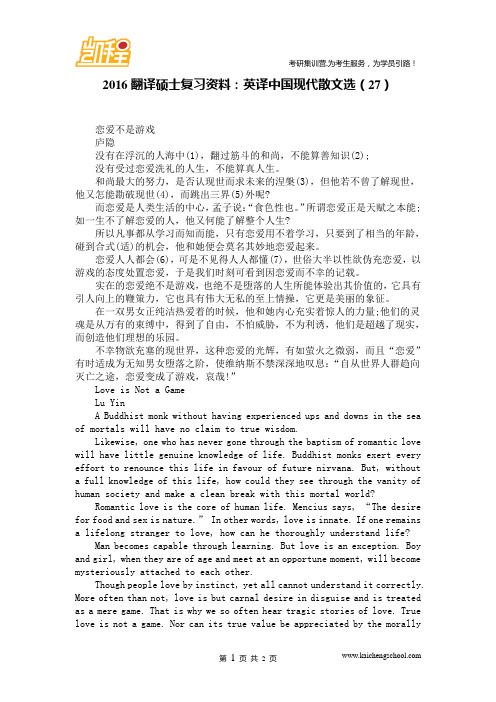
2016翻译硕士复习资料:英译中国现代散文选(27)恋爱不是游戏庐隐没有在浮沉的人海中(1),翻过筋斗的和尚,不能算善知识(2);没有受过恋爱洗礼的人生,不能算真人生。
和尚最大的努力,是否认现世而求未来的涅槃(3),但他若不曾了解现世,他又怎能勘破现世(4),而跳出三界(5)外呢?而恋爱是人类生活的中心,孟子说:“食色性也。
”所谓恋爱正是天赋之本能;如一生不了解恋爱的人,他又何能了解整个人生?所以凡事都从学习而知而能,只有恋爱用不着学习,只要到了相当的年龄,碰到合式(适)的机会,他和她便会莫名其妙地恋爱起来。
恋爱人人都会(6),可是不见得人人都懂(7),世俗大半以性欲伪充恋爱,以游戏的态度处置恋爱,于是我们时刻可看到因恋爱而不幸的记载。
实在的恋爱绝不是游戏,也绝不是堕落的人生所能体验出其价值的,它具有引人向上的鞭策力,它也具有伟大无私的至上情操,它更是美丽的象征。
在一双男女正纯洁热爱着的时候,他和她内心充实着惊人的力量;他们的灵魂是从万有的束缚中,得到了自由,不怕威胁,不为利诱,他们是超越了现实,而创造他们理想的乐园。
不幸物欲充塞的现世界,这种恋爱的光辉,有如萤火之微弱,而且“恋爱”有时适成为无知男女堕落之阶,使维纳斯不禁深深地叹息:“自从世界人群趋向灭亡之途,恋爱变成了游戏,哀哉!”Love is Not a GameLu YinA Buddhist monk without having experienced ups and downs in the sea of mortals will have no claim to true wisdom.Likewise, one who has never gone through the baptism of romantic love will have little genuine knowledge of life. Buddhist monks exert every effort to renounce this life in favour of future nirvana. But, without a full knowledge of this life, how could they see through the vanity of human society and make a clean break with this mortal world?Romantic love is the core of human life. Mencius says, “The desire for food and sex is nature.” In other words, love is innate. If one remains a lifelong stranger to love, how can he thoroughly understand life?Man becomes capable through learning. But love is an exception. Boy and girl, when they are of age and meet at an opportune moment, will become mysteriously attached to each other.Though people love by instinct, yet all cannot understand it correctly. More often than not, love is but carnal desire in disguise and is treated as a mere game. That is why we so often hear tragic stories of love. True love is not a game. Nor can its true value be appreciated by the morallydegenerate.True love spurs one on to higher attainment. It embodies the supreme quality of selflessness, and is, above all, symbolic of beauty.When a man and woman are deeply immersed in true love, they are full of amazing inner strength. Their souls are freed from all bondage. They are unyielding before threats and incorruptible before any promise of material gain. They transcend the reality to create an ideal paradise of their own.Unfortunately, in this present world overflowing with material desires, this kind of true love is as rare as the feeble light of fireflies. What is more, “love” sometimes even leads to moral degeneration on the part of ignorant men and women. Over this, Venus cannot help lamenting with a deep sigh, “Love has become a mere game ever since humanity set out on its way to extinction. O what a sad story!”注释:女作家庐隐(1898-1934),福建闽侯人,早期与冰心齐名。
翻译硕士复习资料英译中国现代散文

翻译硕士复习资料英译中国现代散文时间即生命梁实秋 最令人怵目惊心的一件事,是看着钟表上的秒针一下一下的移动,每移动一下就是表示我们的寿命已经缩短了一部分。
再看看墙上挂着的可以一张张撕下的日历,每天撕下一张就是表示我们寿命又缩短了一天,因为时间即生命,没有人不爱惜他的生命,但很少人珍视他时间。
如果想在有生之年做一点什么事,学一点什么学问,充实自己,帮助别人,使生命成为有意义,不虚此生,那么就不可浪费光阴。
这道理人人都懂(1),可是很少人真能积极不懈的善为利用他的时间。
我自己就是浪费了很多时间的一个人(2)。
我不打麻将,我不经常的听戏看电影,几年中难得一次,我不长时间看电视,通常只看半个小时,我也不串门子闲聊天。
有人问我:“那么你大部分时间都做了些什么呢?”我痛自反省,我发现,除了职务上的必须及人情上所不能免的活动外,我的时间大部分都浪费了。
我应该集中精力,读我所未读过的书,我应该利用所有时间,写我所要写的东西。
但是我没能这样做。
我的好多时间都糊里糊涂的混过去了,“少壮不努力,老大徒伤悲。
” 例如我翻译莎士比亚,本来计划于课余之暇每年翻译两部,二十年即可完成,但是我用了三十年,主要的原因是懒。
翻译之所以完成,主要的是因为活得相当长久,十分惊险(3)。
翻译完成之后,虽然仍有工作计划,但体力渐衰,有力不从心之感(4)。
假使年轻的时候鞭策自己,如今当有较好或较多的表现。
然而悔之晚矣。
再例如,作为一个中国人,经书不可不读。
我年三十才知道读书自修的重要(5)。
我披阅,我圈点。
但是恒心不足,时作时辍。
五十以学易,可以无大过矣(6),我如今年过八十,还没有接触过《易经》,说来惭愧。
史书也很重要。
我出国留学的时候,我父亲买了一套同文石印的前四史(7),塞满了我的行箧的一半空间,我在外国混了几年之后又把前四史原封带回来了。
直到四十年后才鼓起勇气读了《通鉴》(8)一遍。
现在我要读的书太多,深感时间有限。
无论做什么事,健康的身体是基本条件。
2016翻译硕士复习资料:英译中国现代散文选(31)

2016翻译硕士复习资料:英译中国现代散文选(31)枣核萧乾动身访美之前,一位旧时同窗写来航空信,再三托付我为他带几棵生枣核(1)。
东西倒不占分量,可是用途却很蹊跷。
从费城出发前,我们就通了电话。
一下车,他已经在站上等了。
掐指一算,分手快半个世纪了,现在都已是风烛残年。
拥抱之后,他就殷切地问我:“带来了吗?”我赶快从手提包里掏出那几棵枣核(2)。
他托在掌心(3),像比珍珠玛瑙还贵重。
他当年那股调皮劲显然还没改。
我问起枣核的用途,他一面往衣兜里揣,一面故弄玄虚地说(4):“等会儿你就明白了。
”那真是座美丽的山城,汽车开去,一路坡上坡下满是一片嫣红。
倘若在中国,这里一定会有枫城之称。
过了几个山坳,他朝枫树丛中一座三层小楼指了指说:“喏,到了。
”汽车拐进草坪,离车库还有三四米,车库就像认识主人似的自动掀起。
朋友有点不好意思地解释说,买这座大房子时,孩子们还上着学,如今都成家立业了。
学生生物生物化学的老伴儿在一家研究所里做营养试验。
他把我安顿在二楼临湖的一个房间后,就领我去踏访他的后花园(5)。
地方不大,布置得却精致匀称(6)。
我们在靠篱笆的一张白色长凳上坐下,他劈头就问我:“觉不觉得这花园有点家乡味道?”经他指点,我留意到台阶两旁是他手栽的两株垂杨柳,草坪中央有个睡莲池。
他感慨良深地对我说:“栽垂柳的时候,我那个小子才五岁,如今在一条核潜艇上当总机械长了。
姑娘在哈佛教书。
家庭和事业都如意,各种新式设备也都有了。
可是我心上总像是缺点什么。
也许是没出息(7),怎么年纪越大,思乡越切。
我现在可充分体会出游子的心境了。
我想厂甸,想隆福寺。
这里一过圣诞,我就想旧历年。
近来,我老是想总布胡同院里那棵枣树。
所以才托你带几棵种籽,试种一下。
”接着,他又指着花园一角堆起的一座假山假山石说(8):“你相信吗(9)?那是我开车到几十里以外,一块块亲手挑选,论公斤买下(10),然后用汽车拉回来的。
那是我们家的‘北海’。
”说到这里,我们两人都不约而同地站了起来。
英译中国现代散文选(通用6篇)
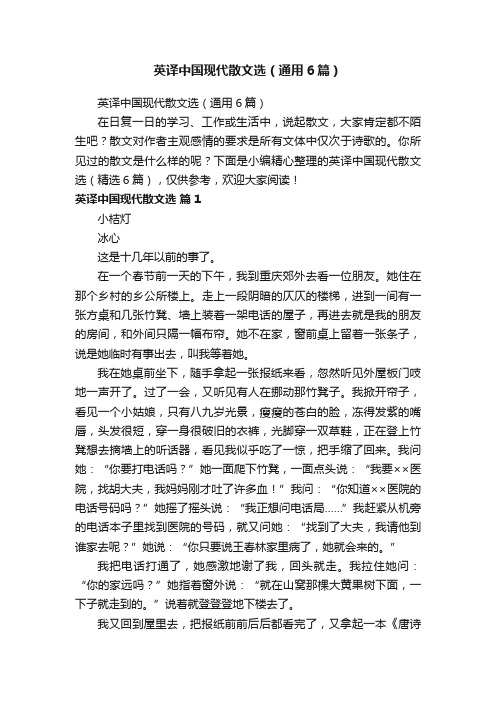
英译中国现代散文选(通用6篇)英译中国现代散文选(通用6篇)在日复一日的学习、工作或生活中,说起散文,大家肯定都不陌生吧?散文对作者主观感情的要求是所有文体中仅次于诗歌的。
你所见过的散文是什么样的呢?下面是小编精心整理的英译中国现代散文选(精选6篇),仅供参考,欢迎大家阅读!英译中国现代散文选篇1小桔灯冰心这是十几年以前的事了。
在一个春节前一天的下午,我到重庆郊外去看一位朋友。
她住在那个乡村的乡公所楼上。
走上一段阴暗的仄仄的楼梯,进到一间有一张方桌和几张竹凳、墙上装着一架电话的屋子,再进去就是我的朋友的房间,和外间只隔一幅布帘。
她不在家,窗前桌上留着一张条子,说是她临时有事出去,叫我等着她。
我在她桌前坐下,随手拿起一张报纸来看,忽然听见外屋板门吱地一声开了。
过了一会,又听见有人在挪动那竹凳子。
我掀开帘子,看见一个小姑娘,只有八九岁光景,瘦瘦的苍白的脸,冻得发紫的嘴唇,头发很短,穿一身很破旧的衣裤,光脚穿一双草鞋,正在登上竹凳想去摘墙上的听话器,看见我似乎吃了一惊,把手缩了回来。
我问她:“你要打电话吗?”她一面爬下竹凳,一面点头说:“我要××医院,找胡大夫,我妈妈刚才吐了许多血!”我问:“你知道××医院的电话号码吗?”她摇了摇头说:“我正想问电话局……”我赶紧从机旁的电话本子里找到医院的号码,就又问她:“找到了大夫,我请他到谁家去呢?”她说:“你只要说王春林家里病了,她就会来的。
”我把电话打通了,她感激地谢了我,回头就走。
我拉住她问:“你的家远吗?”她指着窗外说:“就在山窝那棵大黄果树下面,一下子就走到的。
”说着就登登登地下楼去了。
我又回到屋里去,把报纸前前后后都看完了,又拿起一本《唐诗三百首》来,看了一半,天色越发阴暗了,我的朋友还不回来。
我无聊地站了起来,望着窗外浓雾里迷茫的山景,看到那棵黄果树下面的小屋,忽然想去探望那个小姑娘和她生病的妈妈。
我下楼在门口买了几个大红的桔子,塞在手提袋里,顺着歪斜不平的石板路,走到那小屋的门口。
2016北京航天航空大学翻译硕士考研张培基《英译中国现代散文选》内部资料

英译中国现代散文选——张培基艰难的国运与雄健的国民——李大钊历史的道路,不会是坦平的,有时走到艰难险阻的境界。
这是全靠雄健的精神才能冲过去的(1)。
一条浩浩荡荡的长江大河,有时流到很宽阔的境界(2),平原无际,一泻万里(3)。
有时流到很逼狭的境界,两岸丛山迭岭,绝壁断崖,江河流于期间,回环曲折,极其险峻(4)。
民族生命的进展,其经历亦复如是。
人类在历史上的生活正如旅行一样。
旅途上的征人(5)所经过的地方,有时是坦荡平原,有时是崎岖险路(6)。
志于旅途的人,走到平坦的地方,因是高高兴兴地向前走,走到崎岖的境界,俞是奇趣横生(7),觉得在此奇绝壮绝(8)的境界,俞能感到一种冒险的美趣(9)。
中华民族现在所逢的史路,是一段崎岖险阻的道路。
在这段道路上,实在亦有一种奇绝壮绝的境至,使我们经过此段道路的人,感得一种壮美的趣味,是非有雄健的精神的,不能够感觉到的。
我们的扬子江、黄河,可以代表我们的民族精神,扬子江及黄河遇见沙漠、遇见山峡都是浩浩荡荡的往前流过去,以成其浊流滚滚,一泻万里的魄势(10)。
目前的艰难境界,那能阻抑我们民族生命的前进。
我们应该拿出雄健的精神,高唱着进行的曲调,在这悲壮歌声中,走过这崎岖险阻的道路。
要知(11)在艰难的国运中建造国家,亦是人生最有趣味的事……。
National Crisis vs Heroic NationLi DazhaoThe course of history is never smooth.It is sometimes beset with difficulties andobstacles and nothing short of a heroic spirit can help surmount them.A mighty long river sometimes flows through a broad section with plains lyingboundless on either side,its waters rolling on non-stop for thousands upon thousands ofmiles.Sometimes it comes up against a narrow section flanked by high mountains andsteep cliffs,winding through a course with many a perilous twist and turn.A nation,in thecourse of its development,fares likewise.The historical course of man’s life is just like a journey.A traveler on a long journeypasses through now a broad,level plain,now a rugged, hazardous road.While adetermined traveler cheerfully continues his journey upon reaching a safe and smoothplace,he finds it still more fascinating to come to a rugged place,the enormouslymagnificent spectacle of which,he feels,is better able to generate in him a wonderfulsensation of adventure.The Chinese nation is now confronted with a rugged and dangerous section of itshistorical course.Nevertheless,there is also in this section a spectacle of enormousmagnificence that inspires in us passers-by a delightful sensation of splendor.And thisdelightful sensation,however,can only be shared by those with a heroic spirit.The Yangtse River and the Yellow River are both symbolic of our national spirit thetwo mighty rivers negotiate deserts and gorges until their turbid torrents surge forwardwith irresistible force.The present national crisis can never obstruct the advance of ournational life.Let us brace up our spirits and march through thisrugged,dangerous road tothe tune of our solemn,stirring songs.The greatest joy of life, mind you,is to build up ourcountry during its most difficult days.注释:李大钊此文载于1923年12月20日《新国民》第一卷第2号上,短小隽永,堪称一首诗意盎然的抒情散文诗。
张培基英译现代散文选2(2)
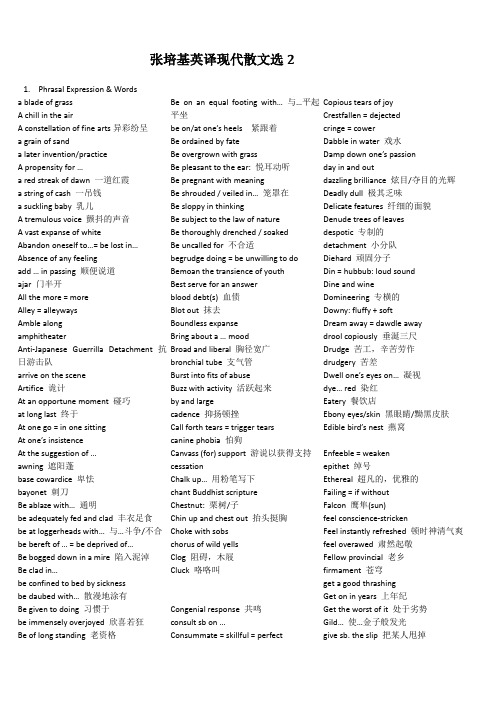
张培基英译现代散文选2 1.Phrasal Expression & Wordsa blade of grassA chill in the airA constellation of fine arts异彩纷呈a grain of sanda later invention/practiceA propensity for …a red streak of dawn 一道红霞a string of cash 一吊钱a suckling baby 乳儿A tremulous voice 颤抖的声音A vast expanse of whiteAbandon oneself to…= be lost in…Absence of any feelingadd … in passing 顺便说道ajar 门半开All the more = moreAlley = alleywaysAmble alongamphitheaterAnti-Japanese Guerrilla Detachment 抗日游击队arrive on the sceneArtifice 诡计At an opportune moment 碰巧at long last 终于At one go = in one sittingAt one’s insistenceAt the suggestion of …awning 遮阳蓬base cowardice 卑怯bayonet 刺刀Be ablaze with…通明be adequately fed and clad 丰衣足食be at loggerheads with…与…斗争/不合be bereft of … = be deprived of…Be bogged down in a mire 陷入泥淖Be clad in…be confined to bed by sicknessbe daubed with…散漫地涂有Be given to doing 习惯于be immensely overjoyed 欣喜若狂Be of long standing 老资格Be on an equal footing with…与…平起平坐be on/at one’s heels 紧跟着Be ordained by fateBe overgrown with grassBe pleasant to the ear: 悦耳动听Be pregnant with meaningBe shrouded / veiled in…笼罩在Be sloppy in thinkingBe subject to the law of natureBe thoroughly drenched / soakedBe uncalled for 不合适begrudge doing = be unwilling to doBemoan the transience of youthBest serve for an answerblood debt(s) 血债Blot out 抹去Boundless expanseBring about a … moodBroad and liberal 胸径宽广bronchial tube 支气管Burst into fits of abuseBuzz with activity 活跃起来by and largecadence 抑扬顿挫Call forth tears = trigger tearscanine phobia 怕狗Canvass (for) support 游说以获得支持cessationChalk up…用粉笔写下chant Buddhist scriptureChestnut: 栗树/子Chin up and chest out 抬头挺胸Choke with sobschorus of wild yellsClog 阻碍,木屐Cluck 咯咯叫Congenial response 共鸣consult sb on …Consummate = skillful = perfectCopious tears of joyCrestfallen = dejectedcringe = cowerDabble in water 戏水Damp down one’s passionday in and outdazzling brilliance 炫目/夺目的光辉Deadly dull 极其乏味Delicate features 纤细的面貌Denude trees of leavesdespotic 专制的detachment 小分队Diehard 顽固分子Din = hubbub: loud soundDine and wineDomineering 专横的Downy: fluffy + softDream away = dawdle awaydrool copiously 垂涎三尺Drudge 苦工,辛苦劳作drudgery 苦差Dwell one’s eyes on…凝视dye… red 染红Eatery 餐饮店Ebony eyes/skin 黑眼睛/黝黑皮肤Edible bird’s nest 燕窝Enfeeble = weakenepithet 绰号Ethereal 超凡的,优雅的Failing = if withoutFalcon 鹰隼(sun)feel conscience-strickenFeel instantly refreshed 顿时神清气爽feel overawed 肃然起敬Fellow provincial 老乡firmament 苍穹get a good thrashingGet on in years 上年纪Get the worst of it 处于劣势Gild…使…金子般发光give sb. the slip 把某人甩掉glazed tile 琉璃瓦gloss over 掩饰glower 怒视gobble up 狼吞虎咽Good wishes = blessing = auspicious remarkGood-for-nothing = lazybonesgosling 小鹅,没经验的年轻人grizzled feather 灰白的羽毛Hanker after 渴望Happen by mere coincidenceharbor/bear hatred/grudge/against…Haughty 高傲的Have the audacity to do …胆敢做Have… all to oneself 独占…Heartening = encouraginghearty thanksHigh aspiration / ambitionHoard for speculation 囤积居奇Hold sway 控制Homing / carrier pigeonhoodwink 欺骗I wouldn’t presume 岂敢immense joyImprint 印记In a dazein expectation of…in spite of oneself 不由自主in the /at dead of night 深夜In the face of the waning sunin the twinkling of an eye 瞬息之间Inhibition 拘谨Into the bargain 而且还…irk = irritateJet black: 乌黑发亮joss stick 香Keep sb at arm’s length 保持距离Kick sb. when he’s down 落井下石Knitted browLay… to rest 安葬,平息Limpid, insipidLinden tree 菩提树loll 懒洋洋地依靠luminous 发光的Lush greenery 草木青青Lush 茂盛的Make a bungle of…弄错man of heroic mettle 有血性的人mandarin jacket 马夫Maxim 格言Megalomania 夸大狂Merit and demeritMerry-makingMope around 闷闷不乐地闲逛Motley: 混杂的Mulish=stubbornmurky 浑浊的,昏暗的Myopia 近视not a soul in sightOld fogey 老顽固On an empty stomach 空着肚子On end 连续,接连Oriole 黄鹂pallor 苍白脸色Pampered / spoilt childPauper = beggarperennial youthPersimmon: 柿子Piping: 尖叫声piteous 可怜的Plaintively = mournfullyplay the fugitive / pursuer 逃/追plumage 全身羽毛Plunge sb. into gloomPolish up 润色pound away 连续打击preen 刻意打扮present a view 立论Privation 贫困Propriety 行为/举止得体或恰当Prosaic 平凡的pure and simple 不折不扣,全然put … to shame 使…黯然失色Put forth buds: 抽芽Quail: 鹌鹑Railing 栏杆Rain pelted/poured downrain-drenched 雨湿的Rank weeks: 丛生的杂草recall … to one’s mindred orb 红日Relive the old daysremnant 遗留物reticence 缄默不语retracted lips 凹陷的嘴唇retrogression in history 历史的退步rickshaw boy/man 黄包车/人力车夫Roost 鸟类栖息处run amok 发狂sanguine = optimisticscamper over 蹦蹦跳跳Scamper: 小动物/孩快蹦scholarly dignity 书生气Second self = bosom friendset pen to paperShanghailandershut… out of viewshy awaySilver dollar 银元sit idle 空坐,空等skirt around 绕开Slipshod 懒散的,随便的smugly 沾沾自喜Social development / progresssolicitude 担心somehow or other 不知怎的somersault 空翻Sparingly 慎用,节省speak volumes for …充分说明Spick-and-span 干干净净spick-and-span 干净,清爽Spiritual barrennessSpongy fine sand 细软沙子Sprightly = energeticstage a demonstrationStalestand guardStand lost in reverieStand to do = be likely to do Standoffish 冷淡的status quoStatus quo现状Steer/keep/stay clear ofstem the tide of progressstirring = excitingStrands of silk 屡屡丝线Straw-ladenstretch far into the distance 伸向远处Strike / touch a (deep) chordStrike up a funeral hymn 奏挽歌swoop down 向下猛冲take … to one’s heels 溜掉Tame = docileTarry = linger Tauntingly = jokinglyThat’s a hard nut to crack.The clatter of mahjong tilesThe droning of machine 机器响声the endearing grandeur of natureThe living presentThe rattle of sabres(军刀)Thump/throb with emotionTip sb. a wink 使眼色touch upon = make mention of …Touch/strike a chordTransience 短暂,易逝Treasure / cherish memorytreat me like dirtTremor: 小颤动underdog 弱者Undeserved reputation 名不副实unflagging energy = energeticUnsheathe 出鞘uphold justiceusher in a new century 迎接新世纪Vent … on/onto…Verdant 翠绿色的Wait on sb伺候Waning sun 残阳Wax and waneWeigh heavily on one’s mind = bother sbwhisk sth. away/off 匆匆带走White fungus 银耳window pane 窗玻璃with gusto 兴致勃勃2.SentenceA creamy white ray streamed in.a large attendance of several thousandbe at the end of resources = exhaust all one’s wits/means/tricks 黔驴技穷Be emaciated and have a sallow face 面黄肌瘦be engraved / imprinted / etched / embedded on one’s mindBe exposed to the serenity of the elementsbe flogged by the scourge of life 受到鞭策Be next door to = stand next to = border onBe tucked away in the depth of memoryendure the torments of hunger 忍饥挨饿Ever lingering love for you despite our separation. 藕断丝连Give sb a sidelong glance over one’s glassesGlance at sb out of the corner of glassesIdentify oneself with broad mass of peopleLook earthward instead of skywardlord it over … = reign over… = resume domination over…Most apt / liable to slip away / slip through fingersMy heart palpitates with awe.Pass through life all but oncePlay ducks and drakes 水面掷石子比赛rise laboriously bit by bit 努力慢慢上升Susceptibility is always better than / preferable to insensibility. Through all lands and all eternity。
2016翻译硕士复习资料:英译中国现代散文选(16)
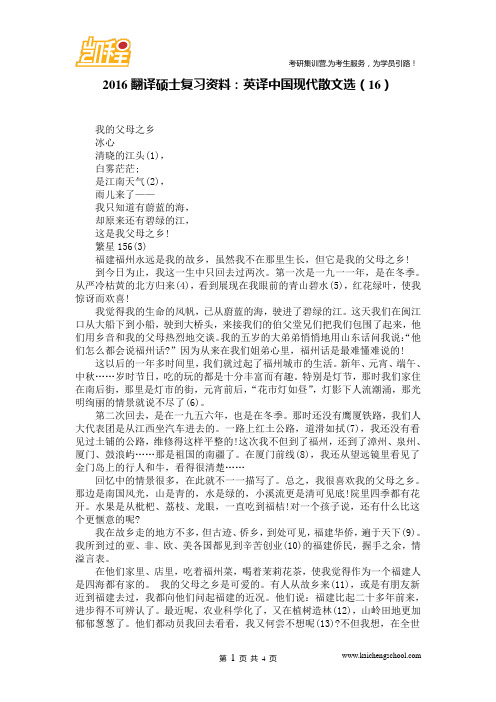
2016翻译硕士复习资料:英译中国现代散文选(16)我的父母之乡冰心清晓的江头(1),白雾茫茫;是江南天气(2),雨儿来了——我只知道有蔚蓝的海,却原来还有碧绿的江,这是我父母之乡!繁星156(3)福建福州永远是我的故乡,虽然我不在那里生长,但它是我的父母之乡!到今日为止,我这一生中只回去过两次。
第一次是一九一一年,是在冬季。
从严冷枯黄的北方归来(4),看到展现在我眼前的青山碧水(5),红花绿叶,使我惊讶而欢喜!我觉得我的生命的风帆,已从蔚蓝的海,驶进了碧绿的江。
这天我们在闽江口从大船下到小船,驶到大桥头,来接我们的伯父堂兄们把我们包围了起来,他们用乡音和我的父母热烈地交谈。
我的五岁的大弟弟悄悄地用山东话问我说:“他们怎么都会说福州话?”因为从来在我们姐弟心里,福州话是最难懂难说的!这以后的一年多时间里,我们就过起了福州城市的生活。
新年、元宵、端午、中秋……岁时节日,吃的玩的都是十分丰富而有趣。
特别是灯节,那时我们家住在南后街,那里是灯市的街,元宵前后,“花市灯如昼”,灯影下人流潮涌,那光明绚丽的情景就说不尽了(6)。
第二次回去,是在一九五六年,也是在冬季。
那时还没有鹰厦铁路,我们人大代表团是从江西坐汽车进去的。
一路上红土公路,道滑如拭(7),我还没有看见过土铺的公路,维修得这样平整的!这次我不但到了福州,还到了漳州、泉州、厦门、鼓浪屿……那是祖国的南疆了。
在厦门前线(8),我还从望远镜里看见了金门岛上的行人和牛,看得很清楚……回忆中的情景很多,在此就不一一描写了。
总之,我很喜欢我的父母之乡。
那边是南国风光,山是青的,水是绿的,小溪流更是清可见底!院里四季都有花开。
水果是从枇杷、荔枝、龙眼,一直吃到福桔!对一个孩子说,还有什么比这个更惬意的呢?我在故乡走的地方不多,但古迹、侨乡,到处可见,福建华侨,遍于天下(9)。
我所到过的亚、非、欧、美各国都见到辛苦创业(10)的福建侨民,握手之余,情溢言表。
2016翻译硕士复习资料:英译中国现代散文选(17)

2016翻译硕士复习资料:英译中国现代散文选(17)祖父和灯火管制(1)冰心一九一一年秋,我们从山东烟台回到福州老家去。
在还乡的路上,母亲和父亲一再嘱咐我(2),“回到福州住在大家庭里,不能再像野孩子(3)似的,一切都要小心。
对长辈们不能没大没小的。
祖父是一家之主,尤其要尊敬……”到了福州,在大家庭里住了下来,我觉得我在归途中的担心是多余的。
祖父、伯父母、叔父母(4)和堂姐妹兄弟(5),都没有把我当作野孩子,大家也都很亲昵平等,并没有什么“规矩”。
我还觉得我们这个大家庭是几个小家庭的很松散的组合(6)。
每个小家庭都是各住各个的,各吃各的,各自有自己的亲戚朋友,比如说,我们就各自有自己的“外婆家(7)”!就在这一年,也许是第二年吧,福州有了电灯公司。
我们这所大房子里也安上了电灯,这在福州也是一件新鲜事,我们这班孩子跟着安装的工人们满房子跑,非常地兴奋欢喜!我记得这电灯是从房顶上吊下来的,每间屋子都有一盏,厅堂上和客室里的五十支光,卧房里的光小一些,厨房里的就更小了。
我们这所大房子里至少也五六十盏灯,第一夜亮起来时,真是灯火辉煌,我们孩子们都拍手欢呼!但是总电门是安在祖父的屋里的。
祖父起得很早也睡得很早(8),每晚九点钟就上床了。
他上床之前,就把电闸关上,于是整个大家庭就是黑沉沉的一片!我们刚回老家(9),父母亲和他们的兄弟妯娌(10)都有许多别情要叙,我们一班弟兄姐妹,也在一起玩得正起劲(11),都很少在晚九点以前睡的。
为了防备(12)这骤然的黑暗,于是每晚在九点以前,每个小家庭都在一两间屋里,点上一盏捻得很暗的煤油灯。
一到九点,电灯一下子都灭了,这几盏煤油灯便都捻亮了,大家相视而笑,又都在灯下谈笑玩耍。
只有在这个时候,我才体会到我们这个大家庭是一个整体,而祖父是一家之主!Grandpa and Nightly BlackoutBing XinIn the autumn of 1911, we returned from Yantai of Shandong Province to our native place Fuzhou. While on the way, my parents warned me again and again, “Since we’ll be living in a big family in Fuzhou, remember always to behave properly and never act like a naughty child. Show respect for your elders, particularly your grandpa, who is head of the family…”After settling down in the big family in Fuzhou, however, I found that my previous worries on the way turned out to be unfounded. My grandpa, uncles, aunties and cousins never thought me a naughty child. We treated each other lovingly and equally. There never existed anything like “family rules of good behaviour”. I also found that the big family was a loose community of several smaller ones, which lived and ate separately. They each had their own relatives and friends, for example, their ownin-laws.That year, or the year after, Fuzhou began to have its own power company and electric lights were to be installed in our big house too. That was something new in our home town. We kids, wild with excitement and joy, ran here and there in the house at the heels of the electricians. Each room, I remember, had an electric lamp hanging from the ceiling. The drawing room had a 50-watt bulb; the bedrooms each a lower-wattage one; the kitchens each an even-lower-wattage one. The whole big house at least had a total of some 60 electric lamps. The first evening when they were turn on, the whole house was suddenly ablaze with lights, we kids clapped with joy.The master switch was fixed in grandpa’s room. Grandpa, who kept early hours, would switch off all the lights when he went to bed at 9 o’clock in the evening, thus plunging the whole big house into deep darkness.Having just set foot in our old home, we seldom slept before 9 o’clock in the evening. For it was but natural that after the long separation, my parents enjoyed hearty chats about the old days with their brothers and in-laws, and we kids of the younger generation played about together to our heart’s content. Hence, in anticipation of the sudden blackout at 9 o’clock, each small family would get a dimly-lit kerosene lamp ready in a couple of their rooms. No sooner had the big house been blacked out on the hour than we turned up the wicks of all the kerosene lamps. And, looking and smiling at each other, we would continue to chat and play merrily by the light of the kerosene lamps.It was then that I realized what a complete whole our big family was, with grandpa as its head.注释:本文写于1982年7月22日,是冰心回忆故乡和童年的一篇深情佳作。
2016翻译硕士复习资料:英译中国现代散文选(23)

2016翻译硕士复习资料:英译中国现代散文选(23)故都的秋郁达夫秋天,无论在什么地方的秋天,总是好的(1);可是啊,北国的秋,却特别地来得清,来得静,来得悲凉。
我的不远千里(2),要从杭州赶上青岛,更要从青岛赶上北平来的理由,也不过想饱尝一尝这“秋”,这故都的秋味。
江南,秋当然也是有的,但草木凋得慢,空气来得润,天的颜色显得淡,并且又时常多雨而少风;一个人夹在苏州上海杭州,或厦门香港广州的市民中间,浑浑沌沌地过去,只能感到一点点清凉,秋的味,秋的色,秋的意境与姿态,总看不饱,尝不透,赏玩不到十足(3)。
秋并不是名花,也并不是美酒,那一种半开,半醉的状态,在领略秋的过程上,是不合适的。
不逢北国之秋,已将近十余年了。
在南方每年到了秋天,总要想陶然亭的芦花,钓鱼台的柳影,西山的虫唱,玉泉的夜月,潭柘寺的钟声(4)。
在北平即使不出门去罢,就是在皇城人海之中,租人家一椽破屋来住着,早晨起来,泡一碗浓茶,向院子一坐,你也能看到很高很高的碧绿的天色,听得到青天下驯鸽的飞声。
从槐树叶底,朝东细数着一丝一丝漏下来的日光,或在破壁腰中,静对着像喇叭似的牵牛花(朝荣)的蓝朵,自然而然地也能感觉到十分的秋意。
说到牵牛花,我以为以蓝色或白色者为佳,紫黑色次之,淡红色最下。
最好,还要在牵牛花底教长着几根疏疏落落的尖细且长的秋草,使作陪衬。
北国的槐树,也是一种能使人联想起秋来的点缀。
像花而又不是花的那一种落蕊,早晨起来,会铺得满地。
脚踏上去,声音也没有,气味也没有,只能感出一点点极微细极柔软的触觉。
扫街在树影下一阵扫后,灰土上留下来的一条条扫帚的丝纹,看起来既觉得细腻,又觉得清闲(5),潜意识下并且还觉得有点儿落寞,古人所说的梧桐一叶而天下知秋的遥想,大约也就在这些深沉的地方。
秋蝉的衰弱的残声,更是北国的特产;因为北平处处全长着树,屋子又低,所以无论在什么地方,都听得见它们的啼唱。
在南方是非要上郊外或山上去才听得到的。
这秋蝉的嘶叫,在北平可和蟋蟀耗子一样,简直像是家家户户都养在家里的家虫(6)。
2016翻译硕士复习资料:英译中国现代散文选(20)
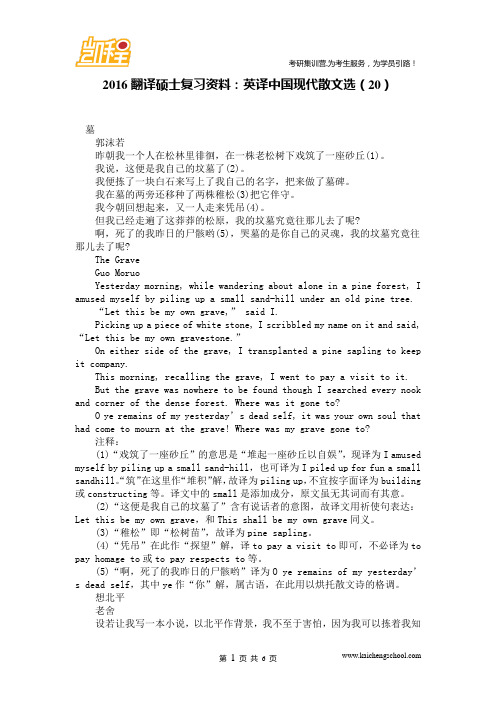
2016翻译硕士复习资料:英译中国现代散文选(20)墓郭沫若昨朝我一个人在松林里徘徊,在一株老松树下戏筑了一座砂丘(1)。
我说,这便是我自己的坟墓了(2)。
我便拣了一块白石来写上了我自己的名字,把来做了墓碑。
我在墓的两旁还移种了两株稚松(3)把它伴守。
我今朝回想起来,又一人走来凭吊(4)。
但我已经走遍了这莽莽的松原,我的坟墓究竟往那儿去了呢?啊,死了的我昨日的尸骸哟(5),哭墓的是你自己的灵魂,我的坟墓究竟往那儿去了呢?The GraveGuo MoruoYesterday morning, while wandering about alone in a pine forest, I amused myself by piling up a small sand-hill under an old pine tree.“Let this be my own grave,” said I.Picking up a piece of white stone, I scribbled my name on it and said, “Let this be my own gravestone.”On either side of the grave, I transplanted a pine sapling to keep it company.This morning, recalling the grave, I went to pay a visit to it.But the grave was nowhere to be found though I searched every nook and corner of the dense forest. Where was it gone to?O ye remains of my yesterday’s dead self, it was your own soul that had come to mourn at the grave! Where was my grave gone to?注释:(1)“戏筑了一座砂丘”的意思是“堆起一座砂丘以自娱”,现译为I amused myself by piling up a small sand-hill,也可译为I piled up for fun a small sandhill。
2016翻译硕士复习资料:英译中国现代散文选(10)
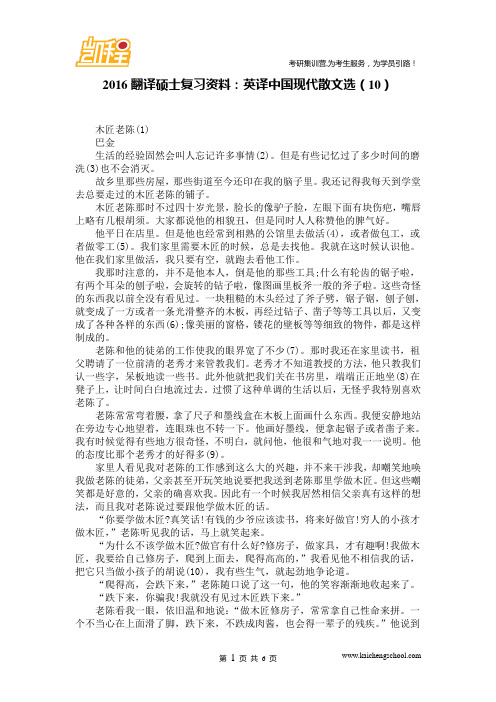
2016翻译硕士复习资料:英译中国现代散文选(10)木匠老陈(1)巴金生活的经验固然会叫人忘记许多事情(2)。
但是有些记忆过了多少时间的磨洗(3)也不会消灭。
故乡里那些房屋,那些街道至今还印在我的脑子里。
我还记得我每天到学堂去总要走过的木匠老陈的铺子。
木匠老陈那时不过四十岁光景,脸长的像驴子脸,左眼下面有块伤疤,嘴唇上略有几根胡须。
大家都说他的相貌丑,但是同时人人称赞他的脾气好。
他平日在店里。
但是他也经常到相熟的公馆里去做活(4),或者做包工,或者做零工(5)。
我们家里需要木匠的时候,总是去找他。
我就在这时候认识他。
他在我们家里做活,我只要有空,就跑去看他工作。
我那时注意的,并不是他本人,倒是他的那些工具;什么有轮齿的锯子啦,有两个耳朵的刨子啦,会旋转的钻子啦,像图画里板斧一般的斧子啦。
这些奇怪的东西我以前全没有看见过。
一块粗糙的木头经过了斧子劈,锯子锯,刨子刨,就变成了一方或者一条光滑整齐的木板,再经过钻子、凿子等等工具以后,又变成了各种各样的东西(6);像美丽的窗格,镂花的壁板等等细致的物件,都是这样制成的。
老陈和他的徒弟的工作使我的眼界宽了不少(7)。
那时我还在家里读书,祖父聘请了一位前清的老秀才来管教我们。
老秀才不知道教授的方法,他只教我们认一些字,呆板地读一些书。
此外他就把我们关在书房里,端端正正地坐(8)在凳子上,让时间白白地流过去。
过惯了这种单调的生活以后,无怪乎我特别喜欢老陈了。
老陈常常弯着腰,拿了尺子和墨线盒在木板上面画什么东西。
我便安静地站在旁边专心地望着,连眼珠也不转一下。
他画好墨线,便拿起锯子或者凿子来。
我有时候觉得有些地方很奇怪,不明白,就问他,他很和气地对我一一说明。
他的态度比那个老秀才的好得多(9)。
家里人看见我对老陈的工作感到这么大的兴趣,并不来干涉我,却嘲笑地唤我做老陈的徒弟,父亲甚至开玩笑地说要把我送到老陈那里学做木匠。
但这些嘲笑都是好意的,父亲的确喜欢我。
因此有一个时候我居然相信父亲真有这样的想法,而且我对老陈说过要跟他学做木匠的话。
翻硕复习资料中国现代散文汉译英
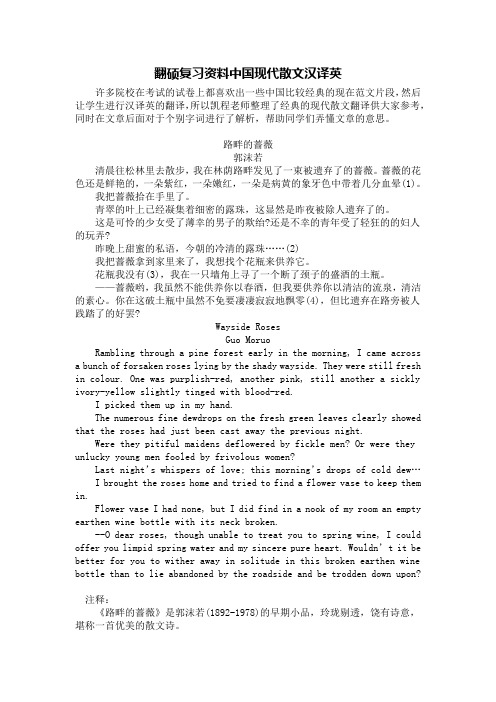
翻硕复习资料中国现代散文汉译英许多院校在考试的试卷上都喜欢出一些中国比较经典的现在范文片段,然后让学生进行汉译英的翻译,所以凯程老师整理了经典的现代散文翻译供大家参考,同时在文章后面对于个别字词进行了解析,帮助同学们弄懂文章的意思。
路畔的蔷薇郭沫若 清晨往松林里去散步,我在林荫路畔发见了一束被遗弃了的蔷薇。
蔷薇的花色还是鲜艳的,一朵紫红,一朵嫩红,一朵是病黄的象牙色中带着几分血晕(1)。
我把蔷薇拾在手里了。
青翠的叶上已经凝集着细密的露珠,这显然是昨夜被除人遗弃了的。
这是可怜的少女受了薄幸的男子的欺绐?还是不幸的青年受了轻狂的的妇人的玩弄? 昨晚上甜蜜的私语,今朝的冷清的露珠 (2) 我把蔷薇拿到家里来了,我想找个花瓶来供养它。
花瓶我没有(3),我在一只墙角上寻了一个断了颈子的盛酒的土瓶。
——蔷薇哟,我虽然不能供养你以春酒,但我要供养你以清洁的流泉,清洁的素心。
你在这破土瓶中虽然不免要凄凄寂寂地飘零(4),但比遗弃在路旁被人践踏了的好罢?Wayside RosesGuo Moruo Rambling through a pine forest early in the morning, I came across a bunch of forsaken roses lying by the shady wayside. They were still fresh in colour. One was purplish-red, another pink, still another a sickly ivory-yellow slightly tinged with blood-red. I picked them up in my hand. The numerous fine dewdrops on the fresh green leaves clearly showed that the roses had just been cast away the previous night. Were they pitiful maidens deflowered by fickle men? Or were they unlucky young men fooled by frivolous women? Last night’s whispers of love; this morning’s drops of cold dew… I brought the roses home and tried to find a flower vase to keep them in. Flower vase I had none, but I did find in a nook of my room an empty earthen wine bottle with its neck broken.--O dear roses, though unable to treat you to spring wine, I could offer you limpid spring water and my sincere pure heart. Wouldn’t it be better for you to wither away in solitude in this broken earthen wine bottle than to lie abandoned by the roadside and be trodden down upon? 注释: 《路畔的蔷薇》是郭沫若(1892-1978)的早期小品,玲珑剔透,饶有诗意,堪称一首优美的散文诗。
2016翻译硕士复习资料:英译中国现代散文选(24)

2016翻译硕士复习资料:英译中国现代散文选(24)谈结婚郁达夫前些日子,林语堂先生似乎曾说过(1)女子的唯一事业,是在结婚,现在一位法国大文豪来沪,对去访问他的新闻记者的谈话之中,又似乎说,男子欲成事业,应该不要结婚。
华盛顿·欧文(2)是一个独身的男子,但《见闻短记》里的一篇歌颂妻子的文章(3),却写的那么优美可爱。
同样查而斯·兰姆(4)也是独身的男子,而爱丽亚的《独身者的不平》(5)一篇,又冷嘲热讽,将结婚的男女和婚后必然的果子——小孩们——等,俏皮到了那一步田地。
究竟是结婚的好呢,还是不结婚的好?这问题似乎同先有鸡还是先有鸡蛋一样(6),常常有人提起,而也常常没有人解决过的问题(7)。
照大体看来,想租房子的时候,是无眷莫问的,想做官的时候,又是朝里无裙(8)莫做官的,想写文章的时候,是独身者(9)不能写我的妻的,凡此种种似乎都是结婚的好。
可是要想结婚,第一要有钱,第二要有闲,第三要有职,这潘驴(10)……的五个条件,却也不容易办到(11)。
更何况结婚之后,“儿子自己要来(12)”,在这世界人口过剩,经济恐慌,教育破产,世风不古的时候,万一不慎,同兰姆所说的一样,儿子们去上了断头台(13),那真是连祖宗三代的楣都要倒尽,那里还有什么“官人请!娘子请!”的唱随之乐(14)可说呢?左思右想,总觉得结婚也不好的,不结婚也是不好的。
A Chat about MarriageYu DafuThe other day, Mr. Lin Yutang said something to the effect that women’s only career lies in matrimony. Now, an eminent French writer declared at a press interview after arriving in Shanghai that men should stay bachelors if they want to achieve success in life.Washington Irving was a confirmed bachelor, but in his Sketch Book there is an article extolling the wife as a graceful and lovely life-long partner. Charles Lamb, also a single man, in A Bachelor’s Complaint of the Behaviour of Married People, one of his essays signed “Elia”, speaks mockingly of married people with their inevitable postnuptial fruits —the children. Marriage or no marriage, which is more desirable? That sounds like the chicken-and- egg question, which, though often discussed, remains a perpetual puzzle. Generally speaking, one who has no family dependants is not supposed to rent a house, one who has no petticoat influence in the government should refrain from becoming an official, an unmarried male writer is in no position to writer about “my wife”. All these seem to hint at the advantage of marriage. But, to get married, you need to have five perquisites, namely, money, leisure, employment, good looks and potentness, of which all are not always available. What is more,after your marriage, your offspring will come to this world of themselves. And in a world with overpopulation, economic crisis, educational bankruptcy and deteriorating public morals, they may, just as Charles Lamb says, through their own acts of indiscretion, be sent to the gallows. With such a terrible misfortune befalling your family, how could you still have wedded bliss to speak of?Thinking the matter over and over again, I cannot but come to the conclusion that neither matrimony nor bachelorship has anything to recommend itself.注释:郁达夫,一生短暂,在恋爱与婚姻上有很多坎坷经历。
- 1、下载文档前请自行甄别文档内容的完整性,平台不提供额外的编辑、内容补充、找答案等附加服务。
- 2、"仅部分预览"的文档,不可在线预览部分如存在完整性等问题,可反馈申请退款(可完整预览的文档不适用该条件!)。
- 3、如文档侵犯您的权益,请联系客服反馈,我们会尽快为您处理(人工客服工作时间:9:00-18:30)。
2016翻译硕士复习资料:英译中国现代散文选(2)螃蟹老螃蟹觉得不安了,觉得全身太硬了(1),自己知道要蜕壳(2)了。
他跑来跑去的寻。
他想寻一个窟穴,躲了身子,将石子堵了穴口,隐隐的蜕壳。
他知道外面蜕壳(3)是危险的。
身子还软(4),要被别的螃蟹吃去的。
这并非空害怕,他实在亲眼见过。
他慌慌张张的走。
旁边的螃蟹(5)问他说:“老兄,你何以这般慌?”他说:“我要蜕壳了。
”“就在这里蜕不是很好么?我还要帮你呢。
”“那可太怕人了。
”“你不怕窟穴里的别的东西,却怕我们同种么?”“我不是怕同种。
”“那是怕什么呢?”“就怕你要吃掉我(6)。
”The CrabAn old crab grew restless. Finding himself stiff all over, he knew it was time for him to moult his shell.He dashed here and there in search of a cave to hide. He was going to block up the mouth of cave so that he could moult in secret. He knew it would be very dangerous to shed his shell in the open because, with his new shell still being soft, he might be eaten up by other crabs. This fear was not groundless for he himself had really seen it happen to other moulting crabs.The old crab kept moving about in a hurry.A nearby crab asked, “Hey, brother, what’s the rush?”“I am going to moult,” answered the old crab. “Wouldn’t it be all right to moult right here? I could help you out with it.”“How horrible that would be!”“You mean while you’ll not scared of other things in the cave you’re scared of your own kind?”“No, I’m not scared of my own kind.”“Then what are you scared of?”“Nothing but being eaten up by you.”注释:《螃蟹》是近年发现的鲁迅佚文。
文章发表于1919年8月间,时值五四运动方兴未艾,作者通过寓言故事,提醒人们新生事物往往有被旧事物消灭于萌芽状态的危险。
(1)“觉得全身太硬了”译为Finding himself stiff al over,其中all over 意即“全身”或“浑身”,作状语短语用。
如逐字译为finding his whole body stiff并无不可,但语言稍欠地道。
(2)“蜕壳”译为to moult his shell,其中to moult 为专用语,意同to cast off。
(3)“外面蜕壳”中的“外面”意即“在露天”,故译为(to moult)in the open,以代替to moult outside the cave。
(4)“身子还软”意即“蜕去旧壳后新壳还软”,故译为with his new shell still being soft。
如按字面直译为with his body still being soft则欠确切,因“身子”在此指“新壳”,不泛指“躯体”。
(5)“旁边的螃蟹”译为A nearby crab比Acrab beside him灵活。
(6)“就怕你要吃掉我”译为Nothing but being eaten up by you, 乃I’m scared of nothing but being eaten up by you之略。
落花生我们屋后有半亩隙地。
母亲说:“让它荒芜着怪可惜,既然你们那么爱吃花生,就辟来做花生园罢(1)。
”我们几个姊弟(2)和几个小丫头都很喜欢——买种的买种,动土的动土,灌园的灌园;过了不几个月,居然收获了!妈妈说:“今晚我们可以做一个收获节(3),也请你们的爹爹来尝尝我们底新花生,如何?”我们都答应了。
母亲把花生做成好几样食品(4),还吩咐这节期要在园里底茅亭举行。
那晚上底天色不大好(5),可是爹爹也来到,实在很难得!爹爹说:“你们爱吃花生吗?”我们都争着答应:“爱!”“谁能把花生底好处说出来?”姊姊说:“花生的气味很美。
”哥哥说:“花生可以榨油。
”我说:“无论何等人都可以用贱价买它来吃;都喜欢吃它。
这是它的好处。
”爹爹说:“花生底用处固然很多;但有一样是很可贵的。
这小小的豆(6)不像那好看的苹果、桃子、石榴,把它们底果实悬在枝上,鲜红嫩绿的颜色(7),令人一望而发生羡慕的心。
它只把果子埋在地底,等到成熟,才容人把它挖出来。
你们偶然看见一棵花生瑟缩(8)地长在地上,不能立刻辨出它有没有果实,非得等到你接触它才能知道。
”我们都说:“是的。
”母亲也点点头。
爹爹接下去说:“所以你们要像花生(9),因为它是有用的,不是伟大、好看的东西。
”我说:“那么,人要做有用的,不要做伟大、体面的人了。
”爹爹说:“这是我对于你们的希望。
”我们谈到夜阑才散,所有花生食品虽然没有了,然而父亲底话现在还印在我心版上。
PeanutsXu DishanBehind our house there lay half a mou of vacant land. Mother said, “it’s a pity to let it lie waste. Since you all like to eat peanuts so very much, why not plant some here?” that exhilarated us children and our servant girls as well, and soon we started buying seeds, ploughing the land and watering the plants. We gathered in a good harvest just after a couple of months!Mother said, “How about giving a party this evening to celebrate the harvest and inviting your Daddy to have a taste of our newly-harvestedpeanuts?” We all agreed. Mother made quite a few varieties of goodies out of the peanuts, and told us that the party would be held in the thatched pavilion on the peanut plot.It looked like rain that evening, yet, to our great joy, father came nevertheless. “Do you like peanuts?” asked father.“Yes, we do!” we vied in giving the answer.“Which of you could name the good things in peanuts?”“Peanuts taste good,” said my elder sister.“Peanuts produce edible oil,” said my elder brother.“Peanuts are so cheap,” said I, “that anyone can afford to eat them. Peanuts are everyone’s favourite. That’s why we call peanuts good.”“It’s true that peanuts have many uses,” said father, “but they’re most beloved in one respect. Unlike nice-looking apples, peaches and pomegranates, which hang their fruit on branches and win people’s admiration with their brilliant colours, tiny little peanuts bury themselves underground and remain unearthed until they’re ripe. When you come upon a peanut plant lying curled up on the ground, you can never immediately tell whether or not it bear any nuts until you touch them.”“That’s true,” we said in unison. Mother also nodded. “So you must take after peanuts,” father continued, “because they’re useful though not great and nice- looking.”“Then you mean one should be useful rather than great andnice-looking,” I said.“That’s what I expect of you,” father concluded. We kept chatting until the party broke up late at night. Today, though nothing is left of the goodies made of peanuts, father’s words remain engraved in my mind.注释:本文是许地山(1892-1941)的名篇。
